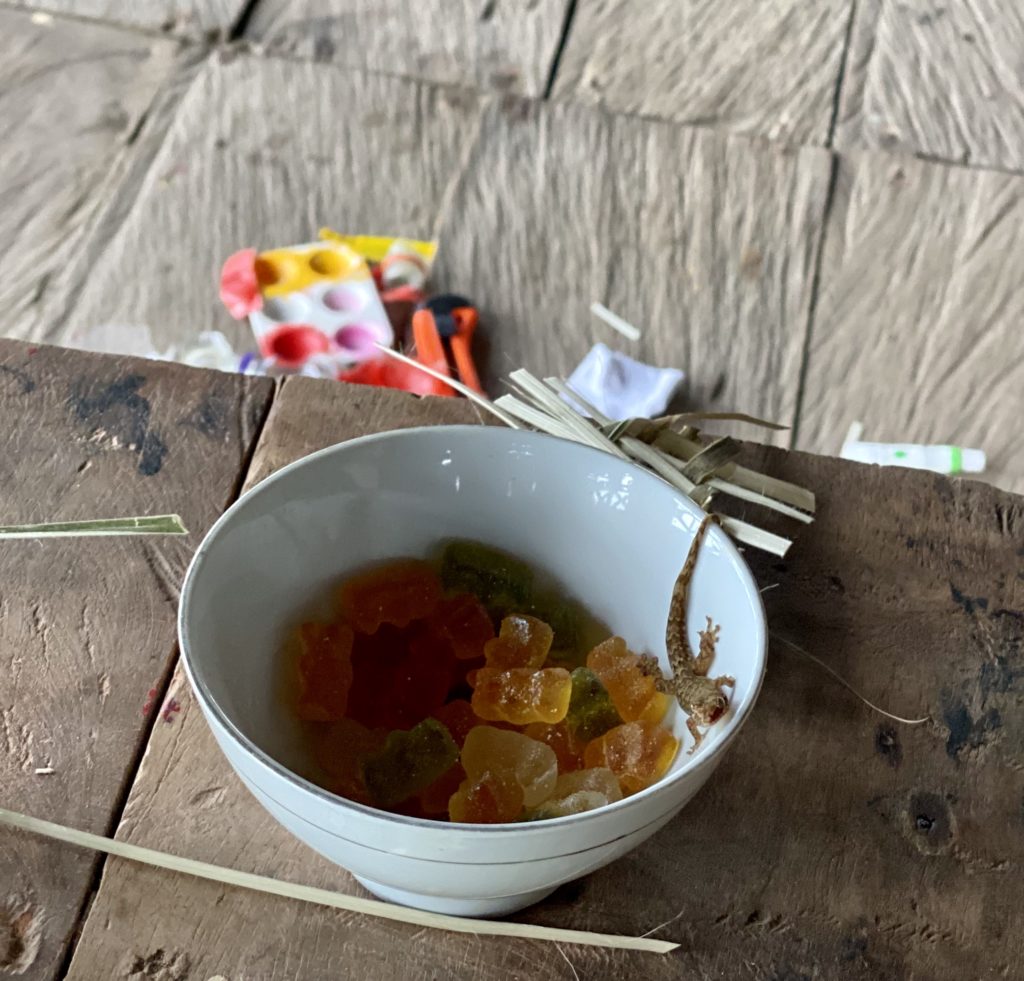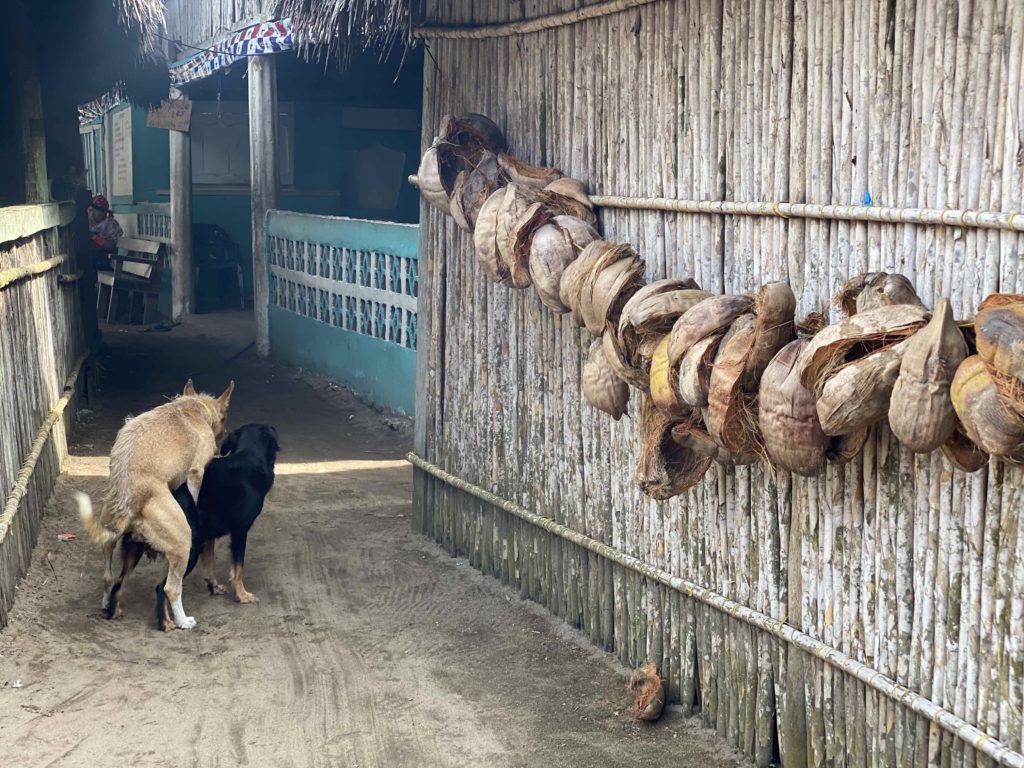It takes an eternity to fall asleep. At one point I imagine that I’m flooded with small ants that are slowly turning inside of me. They revolve and make me feel really warm. It’s odd, because I have never had any problem going to sleep before while here in Armila.
The chicha is well and truly over this morning. I think they were going all the way to midnight, the cut-off point and then after midnight, complete silence. But this morning, some locals are determined to keep the party going in their houses, swigging beers and dancing drunkenly about. The majority of the men, though, are down for the count. When I step out to get my clothes off the clothesline, there are a few men in a couple of canoes pulled up onto the riverbank. One claps, and the other one claps a bit more, then the first one claps again. And then they all laugh together. It’s quite hilarious.
Part of me feels like I should have spent more time in the chicha house, but that would have meant accepting more to drink. And it was really pretty strong. Also, none of the other artists were inclined to hang out. I guess after the first night, everyone was a bit wary. Also, the constant tobacco smoke really sears the lungs. I could barely swallow my food after that first night. I can’t imagine the state of the tobacco blower’s lungs. Maybe they resemble the interior of a corroded steel pipe. But I am also reminded that this is not a tourist experience, that this is part of community life, albeit a rare and more significant occasion. The chicha is for them, and they are being polite and gracious by allowing us to observe, and even participate. So I am grateful that we saw as much as we did.
The mice came down to play in Caroline and Maria’s room last night. Caroline kept flashing her light on them and they would dart up to the rafters again. One of them bit through her salt pill. To replenish lost minerals and all. They had a pool party in the tarpaulin that hung above the mosquito net in Charlotte’s room. It works as a catchment, but also as a small pool for the mice. We suggest leaving Lluvia, the cat, in the room. She may just be a kitten but the other day, she defanged and ate a scorpion! Super badass.
Over breakfast, we discuss things we need or want to do with the time left to us. I haven’t yet crossed the river to the other beach. There’s also jagua, kind of temporary ink like henna that we could make to draw tattoos or body paint. Caroline wants to make more audio recordings in the village. I haven’t yet received permission to fly the drone, and may never will. It feels like you need three months here to work at something more extensive and layered. Three weeks is way too brief. There will be an open studio at 3pm on Tuesday, and we’ll show or speak about what we’ve been working on.
I don’t want to go back to the plastic world.
We have difficulty telling Guna women apart. All Chinese people look the same to me. Maria calls it face blindness. Apparently it is a thing. Maria has it quite severely. I recognise faces but not names. Is there such a thing as name blindness? Or am I just not able to fire the right synapses because I don’t want to? But this sense of not being able to recognise people you are meant to recognise can be very draining and does cause loads of social anxiety. It’s like having an app open on your phone that drains the battery without you realising it.
There’s a particular seed that some of us have been collecting from a particular section of the beach. I call it a hamburger seed. Maria has seen it elsewhere and think she knows it as crow’s eyes. Luz thinks it comes from the rubber tree, which I doubt and Luis says that it is hollowed out and used to hold a joint, a ‘roach clip’.
Words / don’t tell much anyway. / To know the bones / of a thing you have to go down deep, down / to where the seagrass roots and even debris – / a coke can, a boot, a purse – can be a crab’s / nest or a trap.
– From ‘Fishing at Hermosa Pier’, R.J. Cantalupo

As I am sitting and updating my journal from last night, I see a small lizard in the bowl of celebratory gummy bears that we had used as a ‘cake’ for Bernie last night. The lizard is slowly but steadily licking the sugar, now slightly wet, from each bear. Shifting its webbed feet very imperceptibly, the pocket of its lungs moving, a tiny bellow. Suddenly, it turns and leaps and lands, perfectly poised, for escape. It is nothing like the dark, dirty-brown lizards back in Singapore. This lizard is yellow and green, dusted with sunlight.
Over lunch, chicken porridge, we listen to Latin music. Porridge is sweet in Iceland; they cook it in milk (like oatmeal, except Icelanders cook oatmeal in water!) and then add cinnamon sugar on top. They usually eat it with blood sausage.
The song we are listening to is a merengue and we debate the differences between vallenato, cumbia and the song after that, a bachata. The cumbia is drum and percussion heavy and originates from African rhythms. The vallenato is music that you listen rather than dance to. It folksy, with an accordion and is from Colombia, with valle (valley) alluding to its rural origins.
The batchada has very typical guitar lines and is a lot faster. The vallenato is what we have been hearing a lot throughout the community these past weeks. So much to think about!

After lunch, we pass by Dog as he is humping the dog from the Internet cafe. We are ashamed for Dog and Caroline tries to get him off but he gets turned around. And stuck. It’s doggystyle in the most painful way possible. Luz said that there’s a specific word in Spanish that describes this, ‘abotonados.’ I look it up and it comes out as ‘buttoned.’ Pretty apt.
I get into a conversation with Charlotte and Caroline about artistic process. Both of them keep versions of their work while I usually edit over what I am doing. And I rarely return to my old poems to mine them for new material. I usually write from nothing. Caroline is very easy-going and not very adamant about keeping her old sketches. But her husband would fish out scraps of sketches that she had thrown. She’s says it doesn’t matter to her, she’s already gotten what she needs out of it. Charlotte is very afraid of starting from scratch, so she starts by sketching found objects like rocks and then moves on to imagined vegetation. I sketch photographed objects in order to slow down how I think about them and then I write a poem as a way of layering thoughts onto the subject matter.
The village is on lockdown because of the robbery yesterday. All the kids are not allowed to play in the streets. But there’s a football game of under-7’s going on in the yard across from ours, where I am napping in the hammock. Somehow, they have decided that they need a referee. Who is dressed all in black and blows his whistle far too enthusiastically. Maybe without a referee, fights would break out and the game wouldn’t be as fluid.
We take a walk after five down the beach and back up ‘Coconut Way,’ a lovely, shaded walk through a coconut plantation. Today is clouded over but at this hour the light through the palm leaves is gorgeous. People are coming back in their canoes with supplies for the week. Maybe they made a run to Puerto Obaldía or made a trip upriver to their fincas. Either way, people seem to have largely sobered up. Maybe the chemist, who made the chicha, Tigre, also made a hangover cure for everyone.
Moths are night butterflies. Does that make them evil?
I thought about going vegetarian on this trip, but decided that it might just mean that I eat a lot more carbs, although the meat substitute is mostly eggs. But if I had done so, I would have missed out on the iguana. As Maria puts it, she’s a culturerarian; she eats culture. So true. I can always get back to veggies and beans and cut the carbs and meat down when I’m back.

